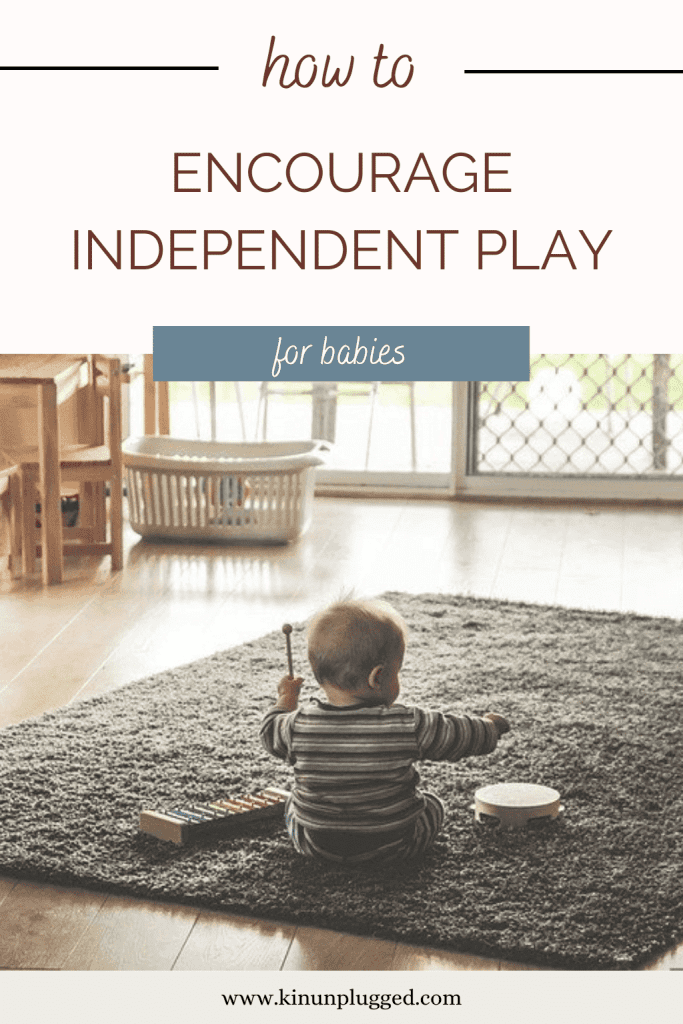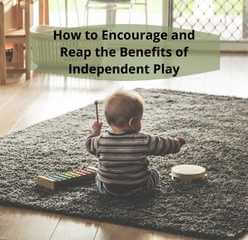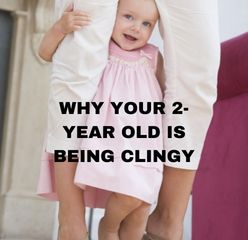When our children were babies, my husband first suggested that they should learn how to play by themselves. I was very skeptical. However, over the years I’ve come to learn how amazing this special play time can be (for both the kids and us!). It took a lot of patience and work, but both our 4-year-old and our 1-year-old play happily in their rooms by themselves. I will forever be grateful for his idea and am excited to share everything we’ve learned as we’ve implemented this awesome type of play.
Table of Contents
ToggleWhat is independent play?
Independent play is when you give your child the space to play alone and let their imagination guide them. It is also commonly referred to as free play and unstructured play.

At what age can a child play independently?
Children can begin playing independently at any age. Instead of focusing on whether or not your child is old enough, look at how your child is responding to this form of play and adjust your expectations accordingly. I started independent play with both of my children when they were babies.
Why is independent play important?
We “play for them” too much
When we play with our children we can easily begin to hover and “play for them.” Let’s say your 18-month-old son is happily playing with blocks, neatly lining them up together. You begin to build a big tower with the blocks and try to get his attention. Your toddler was clearly focused on building a line and not a tower with his blocks. As a certified teacher, I can tell you that the best way a child learns is through the things they are interested in. In this case, your son was interested in making a line.
Instead of bringing his attention to a different activity, pay attention to what he is currently doing. Going back to the blocks situation, your son was making a line. You can participate in his play by adding a block to his line, helping him count them, pointing out the colors or pictures, etc. When you pay attention to what your child likes, he is more likely to grow in his learning.
How does this apply to independent play? By stepping back and allowing your child to play on their own, you stop “playing for them” altogether. You allow them to have the freedom to explore what they want and how they want.
Alone time is healthy
It’s OK to be alone. In fact, it’s healthy, even for extroverted kids. We all need alone time to decompress. Young children can get overwhelmed and alone time is a great way to reset.
The benefits of independent play
Benefits for children
Independent play fosters creativity and imagination in children. My son is the most creative when he’s been playing alone. I’ll never forget when he was a little over a year old and was playing in his pack-and-play with some blocks while I did the dishes. I looked over and noticed that he was balancing the blocks along the side of the pack-and-play by leaning them against the wall. He was so proud of himself whenever he successfully placed one. I never would have thought to do that with the blocks. That’s when it hit me: I can’t think like a 1-year-old. My son comes up with ways of playing that I never would have imagined. By allowing him the space to play alone, I encourage those creative ideas to surface.
Other benefits for children include independence, an increase in problem-solving skills, and opportunities to be calm and peaceful.
Benefits for the parents

Being a parent is the most rewarding thing you’ll ever do. That being said, we all need a break sometimes. Here are all of the benefits of independent play for you as a parent. As you work up to longer independent play times for your child, you’ll be able to experience more and more of these benefits:
- You’ll have more time to do those chores you’ve been putting off
- You can finally do something you love
- You can prioritize your marriage: Take advantage of this extra time and play a board game or do yoga together
- You’ll have time for self-care
- You’ll experience a “reset” yourself
How do you develop independent play?
How to begin independent play for babies.
It’s important to begin slowly. This will take weeks to fully implement and that’s OK! Begin when you and your baby feel ready. Note that each step below is a type of independent play so feel free to mix and match throughout the day once you have mastered them all.
- Start by letting your child play on the floor and alone while you are in the room: Doing this will (1) show your child they are not dependent on you for playtime and (2) help you see that your baby can play alone. You may not be actively playing with your child, but they can clearly see and talk to you.
- Next, put your baby into a pack-and-play or crib while you stay in the room. Do a chore or read. If your baby seems apprehensive or fussy, talk to them.
- Your baby will then be ready to play in their crib without you in the room: This takes the one above to the next level as they are still confined but are not able to see you.
Notice which steps your child is reacting well to and do more of these. Work slowly up to doing the other ones that your child may not be as fond of.
How to begin independent play for toddlers and older children
The steps above can definitely be applied to toddlers. However, because toddlers are more mobile and begin to express their feelings, I felt some extra steps would be helpful for this age group.
- Make quality time with your toddler a priority: If your child is not getting enough time with you (no phones or distractions), chances are they’ll be less receptive to playing alone.
- Make it sound fun: Sing a song before free play to get them excited!
- Give praise: Notice when your child has made something awesome during free play and praise them. This will make them feel good about their alone time.
- Don’t turn it into a punishment: Let’s say your toddler has been particularly overwhelming and you need a break. This is a great time to use independent play as it’ll give you some space to breathe. However, don’t make it seem like they are being punished! This will lead to negative associations with their alone time.
The ultimate goal is for your toddler to play alone in their room or a playroom. This is the last level of independent play and requires a lot of practice, patience, and trust. See below for ideas on how to make sure your play space is right for this level of free play.
How long should independent play last?
If you Google this question, you’ll get very specific answers. My answer: it depends on (1) you, (2) your child, and (3) what type of independent play your child is doing (playing with you in the room or not). First of all, assess your comfort level. Depending on how old your child is, you might only be comfortable with 5-10 minutes of alone time. However, make sure to take note of how your child is reacting to independent play, in general.
If the 10 minutes are up but your child is having fun, let them play for another couple of minutes. This will also encourage longer free play times as your child becomes accustomed to it. The type of independent play is important too. Your child might last longer in their pack-and-play with you in the room compared to when they are completely alone.
How to pick the right play space
As noted above, pack-and-plays and cribs are great spaces for independent play. If you have a video monitor, this is a great time to turn it on so you can keep an eye on your child.
Once your child is older and ready to play in their room without being confined to a crib, you’ll need to pay extra attention to the play space. Secure furniture to the walls and ensure anything dangerous is out of reach. Consider putting a gate on the room so that your child cannot roam around the house unattended. Outlets should have covers and watch out for cords. A 2-year-old may know they’re not supposed to play with cords, but there will definitely be times where they are just too curious to stop themselves.
Toys for independent play
Any toy can be used for independent play. Choose toys that (1) your child loves and (2) you are comfortable letting your child play alone with. Stay away from toys that have small, removable parts. You don’t want any chocking hazards around your child.
Take notice of things your child likes. What are their favorite toys? Do they like to build things or do they prefer toys they can cuddle with? Reserve some special toys that they only get to play with during alone time to make the time more fun.
RELATED: The Best Toys for 2 Year Old Girls

Children can get overwhelmed easily. Having too many toys in their independent play space might not be the best idea. Try out various amounts to find what works for your child.
Always inspect toys to ensure pieces aren’t coming loose and that they are still safe.
Challenges

My child won’t play by himself
I get it. When I first started putting my baby in her pack-and-play, she hated it. There was a lot of crying. Follow the steps above and go very slow if this is the case. Find something your child really likes and only let them play with it during independent play. Also start with very short increments or allowing your child to play independently while you are still in the room. I promise it gets better and they not only get used to playing alone but begin to enjoy it too!
My child is 5. Is it too late to implement independent play?
It’s never too late to begin free play! Since your child is older, you can have more rational conversations about the important of this type of play. You can also let them have some input: maybe they want to color, build something, read books, etc.
My child used to play by herself by won’t anymore. What is going on?
READ: Why is your 2 year being clingy?
You child is going to have off days, just like everyone does. Illness, growth spurts, hunger, and lack of sleep can all affect how your child responds to independent play on any given day. Children also go through so many phases. The important thing is to stick to a routine and continue to encourage free play.
Final thoughts
Remember to go slow and pay attention to what your child likes. Make this a priority and you will soon see how beneficial it is for both you and your child.
____________________________________________________________________________
About the author: Melissa is the Founder of Connect Again, a marriage blog focused on helping couples reconnect and thrive in their relationship. She received her Bachelor of Business Administration at the University of Texas at Austin and her Master of Arts in Teaching at North Carolina State University. She lives in North Carolina with her 2 kids and husband (who she adores!).







1 Comment
Thanks for the ideas! My daughter is great at independent play but only when she knows she can reach me at any time. It is something I should start with my baby